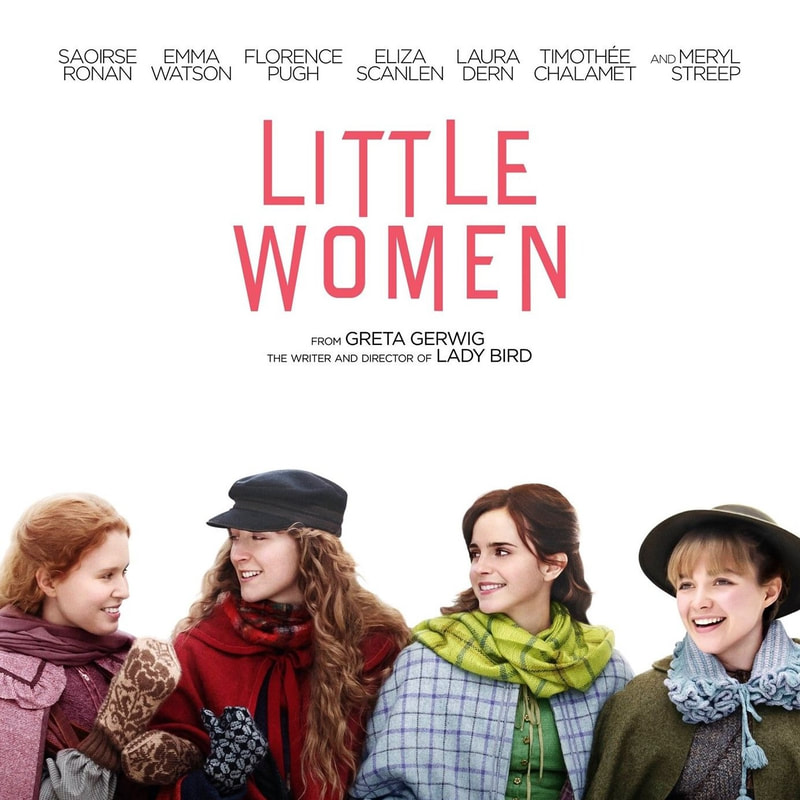|
Volume 19, Issue 5 Tim Irving 5 Stars Greta Gerwig’s Little Women (2019), available on Amazon Prime, is the most joyous film you’ll ever see. While the film did earn $200 million at the box office, and also received six Academy Award nominations, I’m of the opinion the film is underrated and underappreciated. To me, there are two possible reasons for this: Firstly, this is the seventh film adaptation of Louisa May Alcott’s 1868 novel of the same name, and I think this causes a degree of ambivalence towards any subsequent adaptation. Secondly, 50% of the population, and I think it’s pretty obvious who I’m talking about here, have either never read the novel or never seen one of the films. Further, this segment of the population likely has a certain apprehensiveness to a film with this title, and certainly an apprehensiveness to a film concentrating on four sisters. To those who are resistant to this film out of concern they won’t care for the subject matter, I have a message - it is so much fun, and it is a film of the highest quality. You simply can’t have a bad time watching it, and I strongly believe it will surprise you. Regarding the fact this is the seventh film adaptation of the source material, I can understand how this fosters doubt, or even criticism. There is potential to argue cynical intentions behind making a film seven times, however I would argue the multiple adaptations speaks more to the timeless nature of the source material, and its importance, rather than greed or Oscar-baiting. Written and directed by Greta Gerwig (Lady Bird, Frances Ha), this adaption uses the source material differently to previous iterations, and this creates an evolution - and perhaps even a modernisation - not seen before. Ironically, there is a modern-day adaptation of Little Women, and this adaptation is somehow less relevant to today than Gerwig’s set in the original 1868. While praise for this fairly lands on Gerwig’s shoulders, Gerwig herself is quick to redirect praise to Alcott’s original material and writings, with an estimated 90% of the dialogue of the film either inspired by or directly taken from Alcott. The most evident alteration is the inclusion of a non-linear structure flashing between the childhood of the sisters and their adulthood. Other adaptations have all progressed linearly, and this approach is probably the one Christopher Nolan would take if he were to adapt the novel. It is a bold choice by Gerwig, and one that is masterfully integrated with the two timelines significantly enhancing what is for many the familiar story of these famous sisters. We see the dreams of childhood and immediately what becomes of them in adulthood, with the contrast between the two periods shrewdly revealing much about the sisters, and womanhood more generally. While many other important alterations exist, arguably the most influential is the alterations to Jo (Saoirse Ronan) and Amy (Florence Pugh). Considering the novel is effectively an adaptation of Alcott’s own life, Gerwig researched the life of Alcott heavily in preparation for the film. As a consequence, Gerwig’s adaptation utilises a contextual interpretation based on the context of Alcott’s life and her intentions behind the novel. Perhaps the greatest beneficiary of Gerwig’s interpretation is Amy, previously by far the most disliked sister. The vain and materialistic Amy becomes likeable and intelligent in the film, a great surprise to readers of the novel. As Jo is loosely based on Alcott herself, Gerwig directly integrated Alcott’s life into Jo, leading to a new ending of the story that recontextualises the ending of the novel. The film features an unbelievable ensemble cast of Saoirse Ronan, Florence Pugh, Emma Watson, Eliza Scanlen, Laura Dern, Meryl Streep, Timothee Chalamet, Bob Odenkirk, Chris Cooper, and Tracy Letts. Six of these actors have received an Oscar nomination at some point, with Ronan and Pugh receiving nominations for this film. Ronan in particular delivers one of the best acting performances of recent years, and the strength of this performance outshines many of the other actors, most noticeably in the more emotional scenes with Chalamet. The person who does, surprisingly, rise to the challenge of Ronan’s performance and acting skills is Pugh, and this is a strong contributing factor for the newfound likeability of Amy in the film. Emma Watson is very bad in this film, and not even her ‘I was in Harry Potter’ nostalgia pass can forgive this performance. Being a professional actor and not being able to maintain a convincing accent always baffles me, and Watson’s performance is even more depressing when considering Emma Stone was originally cast in the role. Stone dropped out for The Favourite (2018) press tour, perhaps leaving Watson without enough preparation time. As an undoubtedly better actress, Stone likely would have easily assimilated into this grouping of highly skilled actors and greatly enhanced the film. Are there more general flaws or weaknesses of the film? Yes, but I don’t care to mention them. Watching the film is just so much damn fun that you don’t care. With a flowing camera that makes you feel like a fifth sister, a terrific score, terrific performances, a wonderful screenplay, and enthralling rapid-fire dialogue, spending time with the March family is a great way to spend two hours. Tim Irving is a first-year JD Student. ... ... ... The views in this article do not necessarily reflect the views of De Minimis or its Editors.
hwhhat
2/4/2021 12:37:38 am
Great review, Tim!
Meep
2/4/2021 10:58:30 am
This was a wonderful film. Great review!
Zahraa
4/4/2021 07:36:09 pm
It’s my favorite film ever! Your review is awesome Comments are closed.
|
Archives
October 2022
|



